Jugaad is a colloquial Hindi word which means making something in an innovative, quick and low cost way with limited resources available. It is a way of life in India that promotes circular economy by repurposing, reusing and recycling useless materials, that would otherwise have been thrown away as waste, in an innovative and useful way.
If ‘Necessity is the mother of invention, dire necessity is the mother of Jugaad’. Poor people in India, mostly in villages, that cannot afford to buy a new product, usually manage with things that are easily available to them and make something in an innovative and useful way to get the job done. But Jugaad is not restricted to poor people. It is an Indian mindset. Here is a simple example- Once the new clothes that we wear outside gets old, we wear it at home. Then after some years it is used to wipe the floors and furniture. In this way the life cycle of a product gets extended. This is in contrary to our western counterparts where anything that gets old or of no use is thrown away immediately. Nowadays the Jugaad system has also made its way into the corporate world as a management technique.
So let’s discuss in detail what this system is and how it can be used to promote circularity with some examples.
The Jugaad mindset
The Jugaad mindset encompasses both – a sense of carefulness (careful use/management of resources) and rapidly getting things done. On one hand it is associated with certain ideas like- frugality, flexibility, simplicity, innovation and intuitiveness. On the other hand, it is associated with ideas like – fast, quick, temporary, just good enough to work or will see later attitudes.
How Jugaad promote circularity
The eco-friendly alternatives that we get in market nowadays are expensive and customers have to pay a premium for them. On the other hand, Jugaad based innovation is driven by resource scarcity and/or motivation to use limited resources in developing solutions. Thus, these products are affordable to a broader market. It not only reduce prices but also promotes circularity by reusing, recycling and repurposing the materials to make something in a useful way.
Jugaad can be seen in almost every Indian middle class households where mothers reuse pickle bottles or jam bottles made of glass to store other food items. Glass takes a long time to biodegrade. Stitching and repairing old or torn out clothes is another way. Often old unused clothes in better condition are turned into cushion covers, blankets or some other clothing items.
Repurposing waste materials in a Jugaad way
There are many examples of how people are using the Jugaad system in an innovative way. Some of them are mentioned below.
Drip irrigation system
Ramesh Bariya, a farmer from Madhya Pradesh used waste glucose water bottles for drip irrigation as there was an acute shortage of water due to delay in monsoon. He cut the upper part of the bottle to create an inlet of water. He hung these near the plants. A steady flow of water was maintained, drip by drip, by using the regulator that is normally used for I.V. in these glucose bottles. The bottles were refilled every morning. This technique was capable to save the crops from drought and also wastage of water was avoided, all in a cost effective way. The plastic glucose bottles would otherwise have been decomposed in landfills as biomedical waste.
Recycled scooter
Mahesh Karmali, a farmer from Jharkhand designed a low cost tractor to plough his field by using an old scooter. He worked as a mechanic in a scooter showroom and that knowledge helped him a lot in designing this tractor. It is cheaper and more efficient than the conventional tractor.
Kabaad se Jugaad initiatives
‘Kabbad se Jugaad’ is an innovative movement in India to control and manage waste by repurposing discarded materials; where Kabaad means trash. Some of the initiatives are:
Meerut nagar nigam
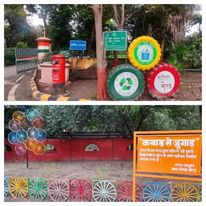
‘Kabaad se Jugaad’ campaign launched by Meerut nagar nigam used scrap, including unused tyres, wheels, drums and iron rods, which were lying unused, in beautifying the intersections and parks across the city by painting them with bright colors.
Agra municipal corporation
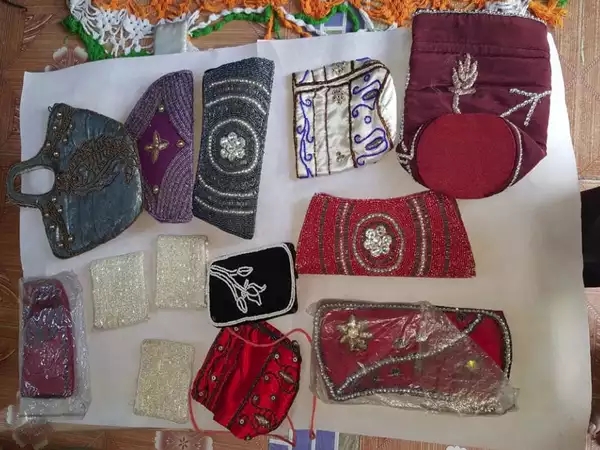
A women self help group from Agra used municipal solid waste to prepare artificial jewellery, decorative pieces, cloth bags, compost and other utility items under the ‘Kabbad se Jugaad’ initiative of Agra Municipal Corporation.
Bhopal municipal corporation
Bhopal municipal corporation in collaboration with the NGO Sanidhya Samiti, Red FM and start-ups Kabadiwala.com and R1 Creations came out with an initiative of door-to-door collection of scrap and E-waste from households. The collection was carried out by Kabadiwala.com. The waste collected were made into innovative artefacts by R1 creations. Two such creations are a saxophone and a giant working radio, all made out of E-waste. Because of this programme the Kabadiwala.com is able to collect 300 kgs of scrap metal everyday which are then reused or recycled into a new product.
Priti international
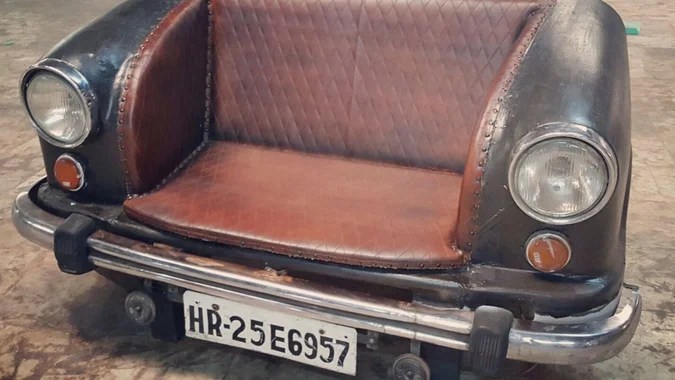
A couple from Jodhpur founded Priti international and made crores of rupees from waste materials through the Jugaad system. Their products range from tin stools made out of old waste tins, bar tables made from old tractors, bags and cushions from old gunny bags, chairs and what not. They export their products to 36 countries around the world.
Like these the Jugaad philosophy is applied in India in various ways – be it making seat out of flat tyres, planters using used plastic bottles, or using leaked AC water for watering plants, etc.
India already has a set of people called ‘Kabadiwalas’ who collect old bottles, tins, papers and jars from door-to-door and bring these to a wholesaler who sells these to a supplier. The supplier offers them back to companies where these can be remade. There are also a set of people who move door-to-door and exchange old clothes for utility items. These clothes are washed, repaired if needed and sold to under-privileged who cannot afford to buy new clothes. These Kabadiwalas are illiterate, yet they know the skills of reusing and recycling items.
Jugaad system in the current scenario
Due to rapid urbanization in India, people in cities no longer make use of the unused items and usually throw them away to buy a new one, like the West. The age old tradition of reusing and repurposing regular household items is slowly fading away. This comes at the cost of the environment. More waste means more space required for landfills. It is high time that we make use of the unused items and repurpose it into something useful, which is also cost effective.
If we want to maintain circular economy, we must understand that this is not supported by the large companies but by the small people like the ‘Kabadiwalas’ who needs support from us. More and more start-ups should come out to collect waste and repurpose and recycle them. Circular economy is not a new concept in Indian households but what we need presently is to grow the minimum impact into a maximum one.
Conclusion
With a Jugaad mindset one can turn waste into gold. Jugaad will continue to inspire innovation for many people in India. In a way one can say that India developed the pillars of circular economy, as what the world is practicing now, has been practiced by the people of India since ages. Support from the Government is needed, especially for the small scale workers like the ‘Kabadiwalas’, who play an important role in recycling waste materials. The west can learn a lot from the Jugaad system of India on minimizing waste and reusing, recycling or repurposing materials that are usually thrown away as waste.


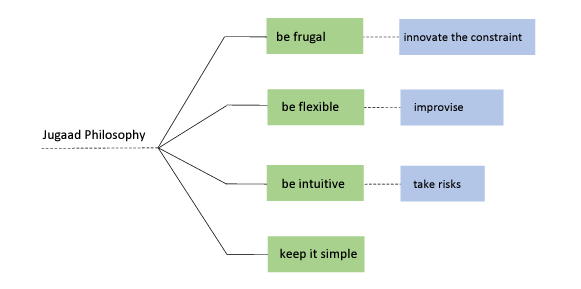
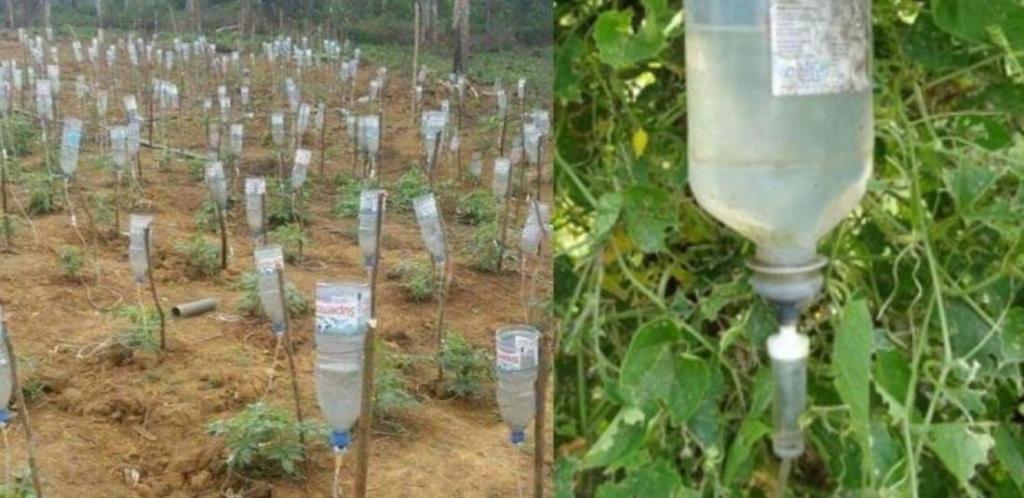
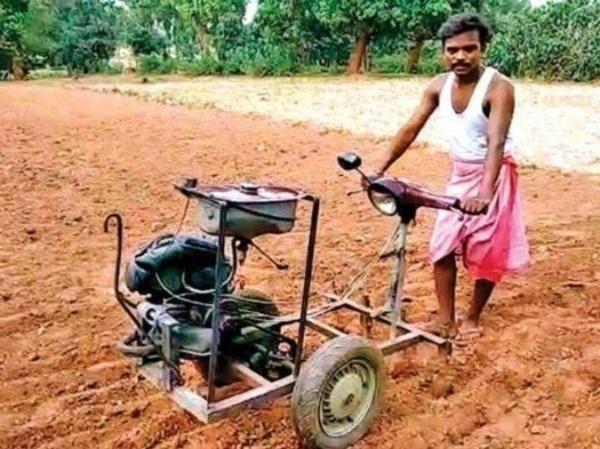
One thought on “How the Jugaad system of India promotes circularity?”